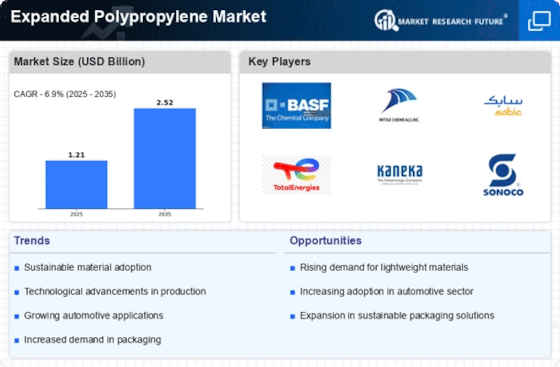Top Industry Leaders in the Expanded Polypropylene Market

Expanded Polypropylene Market
Expanded polypropylene (EPP), with its remarkable combination of lightness, resilience, and versatility, has carved a significant niche in the material world. Its applications span across industries – from automotive components and protective gear to packaging and consumer goods. Understanding the competitive landscape of this dynamic market is key to navigating its complexities and identifying potential opportunities.
Strategies Shaping the Market:
In this ever-evolving space, established players like JSP Corporation, BASF SE, and Kaneka Corporation employ a range of strategies to maintain their dominance:
-
Product innovation: Developing new EPP grades with enhanced properties like fire retardancy, chemical resistance, and improved energy absorption. -
Sustainability focus: Investing in bio-based and recyclable EPP solutions to address environmental concerns and cater to growing consumer demand. -
Geographical expansion: Targeting high-growth regions like Asia Pacific and Latin America with customized solutions and local production facilities. -
Vertical integration: Strengthening control over the supply chain by acquiring raw material suppliers or expanding into downstream applications. -
Strategic partnerships: Collaborating with research institutions and technology startups to accelerate innovation and access new markets.
Factors Dictating Market Share:
The battle for market share is fierce, with success hinged on several key factors:
-
Product quality and performance: Providing EPP with consistent properties, meeting industry standards, and ensuring reliable performance in diverse applications. -
Cost competitiveness: Balancing high quality with affordable pricing, especially in price-sensitive segments like packaging. -
Technological expertise: Continuously innovating and staying ahead of the curve with cutting-edge advancements in EPP formulations and manufacturing processes. -
Customer service and support: Building strong relationships with clients by offering technical expertise, timely deliveries, and efficient after-sales support. -
Sustainability credentials: Demonstrating a commitment to environmental responsibility through the use of recycled materials, bio-based EPP, and energy-efficient production processes.
Key Companies in the Expanded Polypropylene market include
AUTOMA MULTI STYRENE
BASF SE
Chemische Fabrik Budenheim KG
Clark Foam Products Corporation
DS Smith
Hanwha Group Izoblok
JSP
KANEKA CORPORATION
K.K. Nag Ltd
Knauf Industries
Package Design & Mfg
Polyfoam Australia Pty Ltd
Sonoco Products Company
Woodbridge
Recent News:
In the year 2020: one of the leading market players, JSP, announced its product line, which is named ARPRO 5134 RE, which contains recycled content of over 25% and they are produced from recycled expanded polypropylene. Therefore they reduce wastage and landfills.
January 2022: by using almost entirely recycled materials, JSP developed ARPRO Revolution. This product has the lowest carbon impact, perfect for non-technical furniture, leisure, and packaging applications.
October 2023: BASF has participated in a deal to divest its Neopolen expanded polypropylene (EPP) business to Knauf Industries GmbH. Neopolen allows the manufacturing of lightweight molded parts for the automotive industry and heating and air conditioning applications. Knauf Industries is a prominent European manufacturer of complex molded parts made of EPP foams and other materials. It employs more than 2,000 people in eight countries. Its customer base is mainly in the air conditioning, automotive, and sports & leisure industries. The transaction contains, among other things, a manufacturing facility at the BASF site in Schwarzheide, Germany, coupled with the products, customer and supplier contracts, intellectual property, and trademark rights.
Kaneka Corporation eyes possible $17 million Westerlo plant investment for Eperan expanded PE/PP particle foams' capacity boosts. This was aimed at enhancing Europe's foam penetration into Europe itself and other global markets. As a result thereof, their worldwide supply chain might get stronger.
Kaneka Corporation may build an enlarged polyolefin foam plant in Rayong, Thailand. To meet the demand from Southeast Asia and India, an investment of $18 million was made to build a production capacity of 3,000 tons per year.










